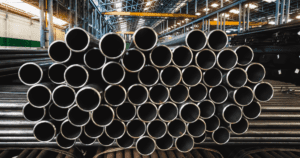
Ukraine’s leading pipe enterprises in January-November of this year increased production of pipes from ferrous metals, according to recent data, by 15.7% year-over-year, to 906,200 tonnes, including 87,100 tonnes produced in November. A source in the industry told Interfax-Ukraine, in particular, the enterprises of the Ukrtruboprom association have increased pipe production by 31.4% over this period, to 649,000 tonnes. Including in November, output amounted to 69,700 tonnes.
In a statement released on Wednesday, Ukrtruboprom welcomed a decision of the Ukrainian authorities to raise the export duty on scrap metal from EUR 58 to EUR 180 per tonne.
“Ukrainian pipe manufacturers expected this measure to restrict the export of strategic raw materials six months ago. It was from the end of spring that the export of ferrous scrap became uncontrolled, which caused a shortage of raw materials and even the import of round billets,” Ukrtruboprom Director General Heorhiy Polsky said, who signed the statement.
At the same time, he noted the timeliness of the duty hike: “It is important that the decision necessary for the Ukrainian pipe industry was made at the beginning of the winter season, when the volume of scrap procurement, the main raw material for production of seamless pipe products, is traditionally reduced.”
According to him, the new export duty will help stabilize the situation with scrap in the domestic market: pipe industry enterprises will be provided with raw materials, and people – with jobs and wages. After all, the export of highly processed products brings to the Ukrainian budget 4 times more taxes than the export of unprocessed raw materials abroad, Polsky summed up.
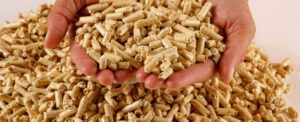
Central Mining and Processing Plant (Kryvy Rih, Dnipropetrovsk region), part of Metinvest Group, in January-October this year, reduced production of commercial pellets, according to recent data, by 0.5% y-o-y, to 1.850 million tonnes.
As the enterprise told Interfax-Ukraine, in October production of pellets amounted to 110,210 tonnes.
Over ten months, Central Mining reduced production of iron ore concentrate by 2.9%, to 3.959 million tonnes, including 433,163 tonnes produced in October.
At the same time, the agency source noted that in recent months, the lag in production this year has been decreasing in comparison with the previous year. So, in particular, the relative level of backlog of production of commercial pellets in nine months of this year was 2.5% y-o-y, and concentrate – 3%.
As Yuriy Ryzhenkov, CEO of Metinvest, recently announced, in 2020 the company received the first high-quality pellets at Central Mining – DRI-class pellets. The next step is Pivnichny (Northern) Mining and Processing Plant.
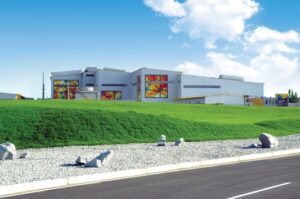
Electric steelmaking complex Interpipe Steel of the international vertically integrated pipe and wheel company Interpipe (Dnipro) in January-October this year increased steel production, according to recent data, by 23.9% compared to the same period last year, to 793,000 tonnes.
As the company told Interfax-Ukraine, 63,000 tonnes of steel were produced in October, while in September – 97,000 tonnes.
According to the information of the enterprise, the reason for a decrease in production volumes was the annual overhaul, which ended on November 1 after 12 days of repair work.
“In addition to traditional replacements of parts and assemblies, which are carried out regularly or periodically in each overhaul, during this time, five sections of a water-cooled gas duct, a bearing on an arc steel-making furnace, and technological axes were set on both continuous casting machines. We have completed all the planned work in full,” the company said in a statement.
Interpipe is a Ukrainian industrial company, a manufacturer of seamless pipes and railway wheels. The company’s products are supplied to more than 80 countries of the world through a network of sales offices located in the key markets of the CIS, the Middle East, North America and Europe. In 2020, Interpipe sold 662,000 tonnes of finished products, including 192,000 tonnes of railway products. Sales of railway products are carried out under the KLW brand.
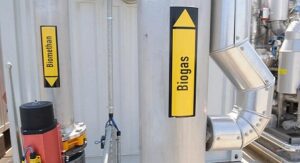
The sale of agricultural products and residues of its production for the operation of biogas plants can become a guarantor of the state’s energy security, the agricultural sector can significantly strengthen NJSC Naftogaz Ukrainy from the point of view of energy independence. As reported on the website of the Ministry of Agrarian Policy and Food on Tuesday with reference to Minister Roman Leshchenko, the adoption at the final reading bill No. 5464 on amendments to the law of Ukraine on alternative fuels regarding the development of biomethane production by the Verkhovna Rada last week gives Ukraine every chance to become a center for the production and supply of biomethane, as well as a source of energy security for Europe.
“In the conditions of very expensive energy resources – gas and electricity, not only food security, but also energy security is impossible without the agricultural sector,” Leshchenko said.
He said that the development of the biomethane market will allow Ukrainian farmers to obtain an alternative source of energy from waste and residues of their own production, and as a result, use biomethane instead of natural gas for the production of heat and electricity, as well as fuel for transport and raw materials for the chemical industry.
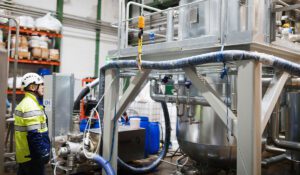
Biosphere Corporation (Dnipro), the largest Ukrainian manufacturer of household and hygienic products, plans in 2022 to launch production of starch-based biopolymers, which will be completely decomposed, founder and CEO of Biosphere Andriy Zdesenko said at the 2021 International Mayors Summit in Kyiv.
“It will be in Dnipro, where we have a plant and a large production cluster. Our task is to make vertical integration,” he told Interfax-Ukraine on the sidelines of the summit, specifying that production of biodegradable bags started by the corporation in early 2020 is carried out from purchased raw materials.
Zdesenko at the summit noted the readiness of Biosphere to supply such biopackages from biopolymers to municipalities for pets. “Only 1% of the total number of owners constantly use packages and clean up after their pets,” the head of the corporation said.
Rostyslav Vovk, CEO and co-owner of Kormotech, a large Ukrainian producer of cat and dog food, added that the company is ready, together with Biosphere and municipalities, to implement projects to collect this waste in parks.
Zdesenko also noted that the corporation is aimed at direct cooperation with cities to build a circular economy “you give us garbage – and we give a finished product.”
“The idea is that we can receive sorted waste not through a network of intermediaries […] but directly from the city. So that we receive the sheeting, make large-size garbage bags out of it for municipal needs and deliver it to the city directly from the factory, also bypassing all the chains of intermediaries, at the most competitive price with the correct dimensions and technologies,” he explained.
According to him, he is conducting such negotiations with mayor of Lviv, “the most advanced city in terms of waste management,” Andriy Sadovy and mayor of Dnipro Borys Filatov.
Zdesenko pointed out: despite the development of the market, today high-quality waste in Ukraine is expensive and in short supply. According to him, a tonne of polyethylene waste of various grades in Poland, the Czech Republic or Lithuania costs about EUR 200, while in Ukraine, which is now practically deprived of the opportunity to import it from Europe due to EU restrictions, it is “EUR 350, or even EUR 400”.
“Buying this raw material, processing it, I, in fact, am not capable of producing a competitive product for export,” he said.
In this regard, Biosphere begins to involve a large number of international companies in the overall waste collection project, in particular, it started the first project with McDonald’s, and the project with PepsiCo is at the start.
Biosphere Corporation has been operating in Ukraine for over 20 years. Its products are presented in the markets of 30 countries in Europe and Asia. The product portfolio includes more than 2,000 items under 13 trademarks.